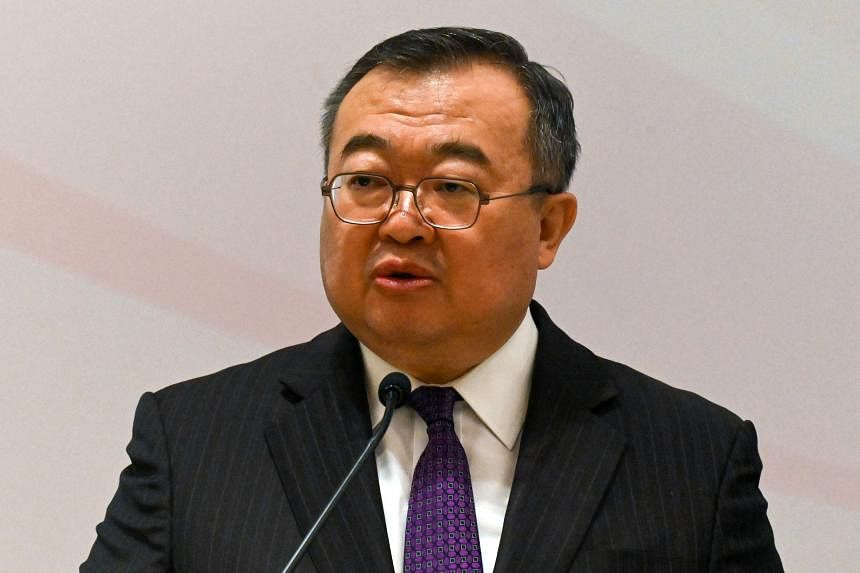SINGAPORE – Post-pandemic, the Communist Party of China’s (CPC) international liaison department is stepping up efforts to better communicate Beijing’s ideas, says senior Chinese diplomat Liu Jianchao.
But the essence of some Chinese phrases cannot be fully captured when translated, and this may make it hard to understand for those in other countries, said Mr Liu, who is Minister of the International Department of the CPC.
“Some purposely translate Chinese idioms using strong language,” he said at the FutureChina dialogue held at Shangri-la Singapore on March 27. The event was co-hosted by non-profit organisation Business China and Singapore’s Chinese-language media Lianhe Zaobao.
“So we try to explain. If you don’t understand after my explanation today, then it is my problem,” said Mr Liu, drawing laughter from the 400-strong audience, which included government officials, academics, business leaders, industry experts and media.
Under President Xi Jinping, Beijing has accelerated efforts in international messaging under the notion of “telling China’s story well”.
Mr Liu first gave a 20-minute speech in English, before participating in a 45-minute dialogue moderated by Ms Lee Huay Leng, editor-in-chief of SPH Media’s Chinese Media Group, and answering questions from the audience in either Mandarin or English.
Mr Liu, who is widely seen by political pundits as a possible contender for the post of China’s foreign minister, said his department, which may not be as familiar to some, focuses on contacts with political parties in other countries under the direction set by the overall Chinese leadership.
In contrast, China’s Foreign Ministry is responsible for government-to-government diplomacy, he said.
Asked by Ms Lee if there is a flow of personnel between the international department and the Foreign Ministry, Mr Liu said it is “quite natural” for staff to move between them. Several of his colleagues have worked in the ministry, and the units complement each other, he said.
Personnel movement, ministers included, between various ministries is frequent as well, he added.
Using himself as an example, Mr Liu said he had worked in other posts, such as the CPC Central Commission for Discipline Inspection.
“For diplomats, we have a saying: Soldiers, wherever they are, they will fight and work wherever they are,” he said.
Mr Liu is in Singapore from March 25 to 28 at the invitation of Foreign Minister Vivian Balakrishnan.
He called on Prime Minister Lee Hsien Loong on March 27, and deputy prime ministers Lawrence Wong and Heng Swee Keat on March 26.
Speculation has been rife that Mr Liu may be China’s next foreign minister, after he made several high-profile trips, including to the United States in January 2024, where he met Secretary of State Antony Blinken and Deputy National Security Adviser Jon Finer.
In July 2023, Mr Qin Gang was abruptly removed as China’s foreign minister, and former foreign minister Wang Yi was reappointed to the post, although most view the reappointment as a placeholder to steady the ship after Mr Qin’s ouster.
Born in north-eastern Jilin province, Mr Liu has extensive diplomatic experience, having served as ambassador to the Philippines and Indonesia. A fluent English speaker, he is a former chief foreign ministry spokesman and studied international relations at the University of Oxford.
In his speech on March 27, Mr Liu acknowledged that there has been growing concern that China’s growth has peaked or that it will face a recession in future.
But he said China has economic resilience despite the headwinds, and the country is in a phase of transition, just like other countries including Singapore.
China, he said, has entered a new development stage where ecological advancement and industrial upgrading serve as the main growth drivers.
The nation’s fundamental strength lies in its vast market of 1.4 billion people, more than 200 mature industrial clusters, and numerous high-quality workers and entrepreneurs, he noted.
“In a nutshell, after years of development, China has established sound and solid fundamentals,” said Mr Liu. “Just as a healthy person also has a strong immune system, the Chinese economy can handle ups and downs.”
Those who are trying to decode developments and signals from China ought to do so from the perspective of an informed observer with a unique viewpoint, he said during the dialogue.
Commenting on China-US ties, Mr Liu said relations have been difficult in recent years. But after the San Francisco meeting between Mr Xi and his American counterpart Joe Biden in November 2023, both sides are working hard to implement the consensus reached by the two leaders.
However, progress has been uneven, he said. The fundamental issue is that the US “still has not abandoned its policy of containing and suppressing China”, said Mr Liu.
“On the one hand, we need to stabilise our relationship. On the other, they are increasing pressure. This situation is what we do not want to see, as it is harmful to both sides.”
On the recent US crackdown on social media platform TikTok, which is owned by Chinese company Bytedance, Mr Liu urged the US to respect the rights and interests of Chinese companies.
“All companies, regardless of their country of origin, should be treated equally and fairly in the US,” he said.
The world, he said in his speech, needs connectivity, not decoupling.
Asia must be vigilant to avoid becoming a “testing ground for parallel systems”, he said.
Long-established industrial supply chains in the region could be disrupted, and Asia may find it harder to achieve prosperity given the mounting difficulties in economic and social developments, he said.
“We need civilisations to engage, not to clash.”


